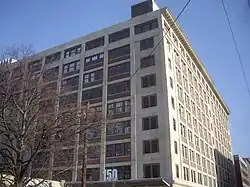Powerhouse Arts District, Jersey City
The Powerhouse Arts District is a historic warehouse district in Downtown Jersey City, New Jersey, United States. Its name derives from the unused generating station Hudson and Manhattan Railroad Powerhouse.[1][2][3] This neighborhood was previously called "WALDO", an acronym for Work And Live District Overlay, but has since been renamed though is still occasionally used on maps and in local parlance. Part of what was once called the Horseshoe Section, the neighborhood's informal borders are Newport to the north, Exchange Place to the east, Paulus Hook to the south and Harsimus Cove to the west.

The landmarked Great Atlantic and Pacific Tea Company Warehouse is located at Provost St., between 1st and Bay Sts (40°43′16″N 74°2′25″W). The Pavonia-Newport, Harsimus Cove, and Harborside stations of the Hudson-Bergen Light Rail, and the Grove Street station of the PATH system are nearby.
WALDO and PAD

WALDO (for "Work and Live District Overlay) was the name of a planning strategy adopted into Jersey City zoning in 2002 per a proposal written by the Urban Land Institute, and was deleted from the zoning on January 24, 2007. As the name implies, the purpose was to most effectively re-use an eight block area of industrial buildings, and transition them to include more residences, without zoning them a purely residential use. Currently, most zoning codes do not allow industrial and residential uses to co-exist on the same lot. The district also aimed at retaining the high bulk, low rise industrial buildings which were threatened by development of high rise towers in the area.
The plan indicated that roughly half of the apartments built in the existing industrial buildings in the eight block neighborhood must go to artists. Under the district plan, two industrial buildings were renovated into loft apartments, and one new building, Waldo Lofts, was constructed. During the district's lifespan, there were several attempts to bring in more housing and studios for artists, to make the area more pedestrian friendly, and to bring in art schools or museums. There were also been proposals to turn the Powerhouse into residences, shops, galleries, and museum space.
Most of the proposals for retail and gallery space never materialized or found tenants, and as a result the eight blocks of industrial buildings remain much the same as in 2002 when the district began. As well, the city approved new zoning for a large development on First Street which deviated from the district plan. New zoning is proposed for several other blocks. Most proposed developments are higher rise structures, and the majority of capital investment in the district favors high rise development. These factors led to WALDO being removed from the zoning ordinance.[4]
Waldo Yards
The term Waldo has been used before the zoning plan was introduced. Waldo Avenue is named for Samuel Waldo who built and owned three attached brownstone homes located on the NW corner of Magnolia and Waldo Avenues. Today, the three structures still stand. The avenue, which runs south from Newark Avenue to "The Island" that overlooks the Waldo Yards, was originally used by the Pennsylvania Railroad Jersey City Branch. It is currently used by Port Authority Trans Hudson mass transit trains.
See also
- 111 First Street (film)
- Hudson and Manhattan Railroad Powerhouse
- List of neighborhoods in Jersey City, New Jersey
- National Register of Historic Places listings in Hudson County, New Jersey
References
- Warehouse Historic District Archived 2008-06-11 at the Wayback Machine
- "Jersey City Powerhouse Official Website". Retrieved 13 April 2016.
- "The Jersey City Independent". The Jersey City Independent. Archived from the original on 31 October 2014. Retrieved 13 April 2016.
- "Adjusting Vision of Waterfront Arts District to Include High Rises". The New York Times. 15 May 2008. Retrieved 13 April 2016.
